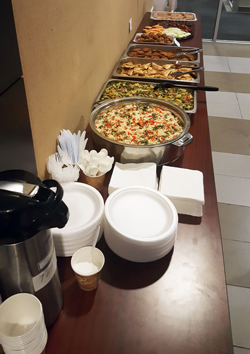‘A precious sense of belonging’: Learning to evaluate the communities we live in

By Ana Gajic

Food prepared by the Catering Collective.
In the heart of Regent Park, a few streetcar stops east of St. Michael’s Hospital and in the middle of one of the world’s largest urban revitalization projects, there exists a small but mighty organization: the Regent Park Catering Collective.
It’s a group of 25 food entrepreneurs in the community who, through the collective, gain access to affordable resources for their business, training, a customer base and a supportive group of fellow entrepreneurs. It is an initiative run by the Centre for Community Learning & Development in Regent Park and organizations like St. Michael’s are able to order affordable catered meals from the collective for everything from small meetings to large events.
Most recently, it went through an evaluation by another unique group in the community – students taking a course offered in partnership with the Centre for Urban Health Solutions of St. Michael’s and designed to further hone the skills of those who live or work in Regent Park to assess whether programs are effective.
Saadia Wasim, who has called this changing community home since 2003 and works as a community animator in the neighbourhood, recently completed the course.
“We have a precious sense of belonging in the community we live and grow in,” said Wasim. “We deserve to be the best critics for the betterment of the neighbourhood.”
This year, students learned about evaluation by doing it – they interviewed members and analyzed surveys from the customers of the Regent Park Catering Collective to evaluate its efficacy in the community. Their evaluation found some key strengths of Collective, such as its ability to build partnerships and the high quality of the food. It also found opportunities for change, such as suggestions to change the model for assigning hours. The course was a win-win: students honed their skills in evaluation and the Collective received constructive feedback.
Creating a course to respond to a community’s needs
Three years ago the Centre for Urban Health Solutions partnered with the Centre for Community Learning & Development in Regent Park, Innis College at the University of Toronto, and The Centre for Addiction and Mental Health (CAMH) to develop the ‘Community Program Evaluation Certificate’ in response to community organizations’ and grassroots groups’ needs and interests.
It’s a free course held at the Centre for Community Learning & Development in Regent Park that teaches the qualitative and quantitative science of program evaluation – a way to assess whether neighbourhood programming is effective. The Centre offered up time from two scientists; some knowledge translation resources, such as consultation to help develop the course structure and content; and logistical in-kind support such as printed materials and identification of teaching assistants.
For 10 weeks, one night a week, students attend this free course, where childcare is offered and a full dinner is served. Those who complete the course requirements receive a certificate from the University of Toronto.
“We worked to ensure there wouldn’t be any barriers to attendance,” said Sureya Ibrahim, Community Relations Specialist at the Centre for Learning & Development at Regent Park, who has lived in Regent Park for 20 years. “The course itself has impacted the community positively – people who care for the children are paid, the catering collective who makes the meals is paid, and of course students learn key skills.”
Dr. Patricia O’Campo, interim vice president of Research at St. Michael’s, alongside Nakia Lee-Foon (PhD(c)) from the Dalla Lana School of Public Health and Dr. Suzanne Zerger from CAMH, helped develop the class and are now instructors.
“We hope to help residents feel like their voice and perspectives can be represented in evaluations of programs – because now they can conduct their own,” Dr. O’Campo said.
A lasting impact
In the course, students learn hands-on skills that can be applied inside and outside of evaluation projects, such as: interviewing, high-quality data collection, qualitative and quantitative data analysis, presentation skills, and group work.
“At the end of the 10 weeks, students presented their analyses and you could see their confidence had grown,” Ibrahim said. “The program is professional and has a lasting impact on the students, who never miss a course.”
The feedback so far has been consistent: the students keep asking for more. The instructors are now looking at ways to remodel the intermediate level to include real-world program evaluation as modules separate from the in-class learning, to maximize both streams.
“The collaboration has been beautiful,” Ibrahim said. “It shows that when you bring the right people together, you can have a true impact on the community.”
About St. Michael’s Hospital
St. Michael’s Hospital provides compassionate care to all who enter its doors. The hospital also provides outstanding medical education to future health care professionals in more than 29 academic disciplines. Critical care and trauma, heart disease, neurosurgery, diabetes, cancer care, care of the homeless and global health are among the Hospital’s recognized areas of expertise. Through the Keenan Research Centre and the Li Ka Shing International Healthcare Education Centre, which make up the Li Ka Shing Knowledge Institute, research and education at St. Michael’s Hospital are recognized and make an impact around the world. Founded in 1892, the hospital is fully affiliated with the University of Toronto.
St. Michael’s Hospital with Providence Healthcare and St. Joseph’s Health Centre now operate under one corporate entity as of August 1, 2017. United, the three organizations serve patients, residents and clients across the full spectrum of care, spanning primary care, secondary community care, tertiary and quaternary care services to post-acute through rehabilitation, palliative care and long-term care, while investing in world-class research and education.
